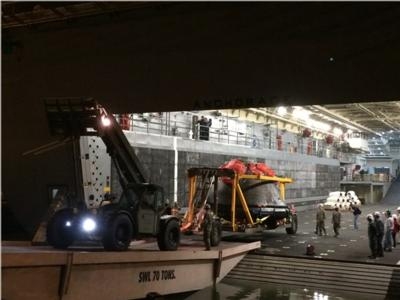Thu, Dec 11, 2014
Engineering Teams Analyzing Heat Shield, Data Recorders From Flight Test
Engineers are getting their first look at the Orion spacecraft following its successful flight test and recovery on Dec. 5. With the spacecraft recovered from the Pacific and brought to port in San Diego, technical teams are examining flight data recorders and samples of the heat shield to learn as much as possible about the performance of key systems during the test.

“The 1,200 on-board sensors will provide us an ocean of information about everything from the effects of space radiation on our avionics to the environment inside the crew cabin,” said Mike Hawes, Lockheed Martin vice president and Orion program manager. “What we learn from this flight will improve Orion’s designs and technology, and help us make future vehicles the best they can be.”
In San Diego engineers have removed samples of the heat shield to examine its performance and ablation rates during re-entry. The samples, along with select data recorders, will be brought to nearby Lockheed Martin facilities for processing. This analysis will help the technical team get a head start in determining how to optimize the development of future heat shields.
Orion will be loaded on a special truck for an estimated two-week trip across the country to Kennedy Space Center in Florida, where NASA and Lockheed Martin engineers will disassemble it and thoroughly examine its structure, computers and instrumentation. In March, as part of the Exploration Flight Test-1 (EFT-1) contract, Lockheed Martin will provide a complete data analysis report to NASA which includes information about the vehicle’s performance and recommendations based on the results.
The EFT-1 crew module will next be used for Ascent Abort Test 2, which is a test of the launch abort system. Orion’s launch abort system is equipped with three powerful motors capable of pulling the capsule and crew a mile up and a mile away from an emergency on the launch pad.
In addition, the Orion team has already begun procuring parts and manufacturing primary structures for the next spacecraft, which will be flown on the upcoming Exploration Mission-1 atop the powerful Space Launch System.
(Image provided by Lockheed Martin)
More News
Outboard Section Of The Right Wing And The Right Flap Separated In Flight And The Airplane Impacted A Farm Field Analysis: The pilot was approaching his destination airport under i>[...]
Final Approach Fix The fix from which the final approach (IFR) to an airport is executed and which identifies the beginning of the final approach segment. It is designated on Gover>[...]
"Our choice of when to respond, how to respond and on which targets to respond is a consideration that we make every time... Netanyahu also noted that anyone attacking Israel &ldqu>[...]
Estimated (EST) When used in NOTAMs “EST” is a contraction that is used by the issuing authority only when the condition is expected to return to service prior to the e>[...]
Aero Linx: Coalition of Airline Pilots Associations (CAPA) The Coalition of Airline Pilots Associations (CAPA) is the world’s largest pilot trade association representing ove>[...]
 NTSB Final Report: Cessna 177B
NTSB Final Report: Cessna 177B ANN's Daily Aero-Term (05.08.25): Final Approach Fix
ANN's Daily Aero-Term (05.08.25): Final Approach Fix Aero-News: Quote of the Day (05.08.25)
Aero-News: Quote of the Day (05.08.25) ANN's Daily Aero-Term (05.09.25): Estimated (EST)
ANN's Daily Aero-Term (05.09.25): Estimated (EST) ANN's Daily Aero-Linx (05.09.25)
ANN's Daily Aero-Linx (05.09.25)



